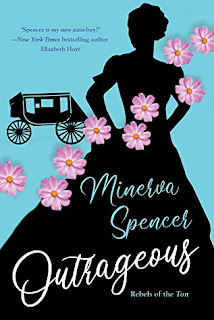4/5 stars on Goodreads
 |
| Outrageous by Minerva Spencer |
Minerva Spencer’s Outrageous is the second book in her Rebels of the Ton historical romance series. I hadn’t read the first book, but I decided to give it a try when I received a free copy from NetGalley.
The story takes place in 1816, but instead of the usual balls and operas of London, it’s mostly set in carriages and seedy inns of the English countryside. Godric Fleming, a decorated war hero and a man bent on avenging his dead family on Gabriel Marlington, has decided to abduct Gabriel’s wife. Only to be abducted himself by Gabriel’s sister Eva de Courtney who has learned of his plan. Her intention is to keep him away from London long enough for Godric to give up his revenge, but weather and other unforeseen factors keep them on the road for days. And, as Godric points out, she’s now compromised in the eyes of the society and they have to marry. She’s not instantly agreeable to the plan, and he isn’t thrilled either.
This was a competent and interesting story.
It relied heavily on some tropes of historical romances like forced intimacy
and a clandestine marriage, but they were handled so that they felt fresh. I
liked Eva and Godric both, and their inevitable falling in love happened
organically and felt believable. The intimate setting meant that most of the
time there was just the two of them, but they could carry the story well
enough. There were enough twists and turns, some of them beggaring belief, to
keep the reader entertained. The cover is somewhat misleading, making the reader expect a romance without sex scenes, but there were plenty of those.
I have a couple of complaints though. The book was too long. Especially the ending that took place after the climax was unnecessary, as it was basically a long filler scene that took several chapters. There’s only so much a reader is willing to learn about the mechanics of horse breeding. And then the reconciliation was handled hastily and was basically a sex scene and not much else despite the issues the couple had. There was nothing romantic or emotional about it. It was followed by a change in the point of view, which gave the conclusion to secondary characters. I found it highly unsatisfying, and it marred my enjoyment of the book.
I would also have liked the author to do a better work with introducing the characters from the first book. Eva had complicated family relations that I presume were handled in the previous book (and some in an earlier series even). They had some bearing in this one, yet the reader was left completely in the dark about who they were and why they mattered for this story. Not everyone read all the books in a series, so a few words here and there would’ve gone a long way to help the reader to understand some plot twists that relied on those relationships.
Nevertheless, I liked the book. It stands out in the mass of historical romances, which isn’t easy to pull off. I’ll be reading the next one too.




